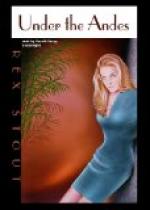“Our old friend, Mr. Dried Fish,” he announced sadly, and gave it up.
Then I tried my luck, and with better success.
First I uncovered a dish of stew, steaming hot! To be sure, it was fish, but it was hot. Then a curious, brittle kind of bread; I call it that, though on trial it appeared to be made from the roe of some kind of fish. Also there was some excellent fish-soup, also hot, and quite delicious.
Four hundred years of development had taught the royal chefs to prepare fish in so many different ways that we almost failed to recognize them as of the same family.
“Couldn’t be better,” said Harry, helping himself liberally to the stew. “We can eat this, and cache the dried stuff. We’ll have enough for an army in a week.”
“As for me, I saw before me the raw material for our weapons. When we had emptied the golden platter that held our “bread,” I secreted it under the cover of the granite couch. When the serving-men called to remove the dishes they apparently did not notice its absence. So far, success.
Some hours later Desiree paid us a second call. She appeared to be in the gayest of spirits, and I eyed her curiously from a seat in the corner as she and Harry sat side by side, chatting for all the world as though they had been in her own Paris drawing-room.
Was it possible that she was really satisfied, as she had said? What imaginable food could these black dwarfs find to appease her tremendous vanity? Or was she merely living the motto of the French philosopher?
Harry was demanding that he be allowed to visit her apartment; this she refused, saying that if he were found there by the king nothing could avert a catastrophe. Harry’s brow grew black; I could see his effort to choke back his anger. Then Desiree led him away from the topic, and soon they were both again laughing merrily.
Some forty-eight hours passed; in that perpetual blackness there was no such thing as day. We saw no one save Desiree and the serving men. Once a messenger appeared carrying a bundle of quipos; I was able to decipher their meaning sufficiently to understand that we were invited to some religious ceremony in the great cavern. But I thought it injudicious to allow a meeting between Harry and the king, and returned a polite refusal.
It may be of interest to some to know the method, which was extremely simple, as in ordinary communications the quipos are easy to read. I removed two knots from the white cord—the sign of affirmative—and placed two additional ones on the black cord—the sign of negative. Then on the yellow cord—the sign of the Child of the Sun and submission to him—I tied two more knots to show that our refusal meant no lack of respect to their deity.
Which, by the way, was not a little curious.
Here were the descendants of the subjects of Manco-Capac, himself a son of the orb of day, still holding to their worship of the sun, though they had not seen its light for four centuries. Deserted by their god, they did not abandon him; an example from which the followers of another and more “civilized” religion might learn something of the potency of faith.




